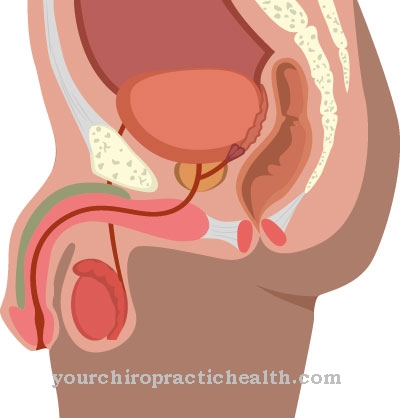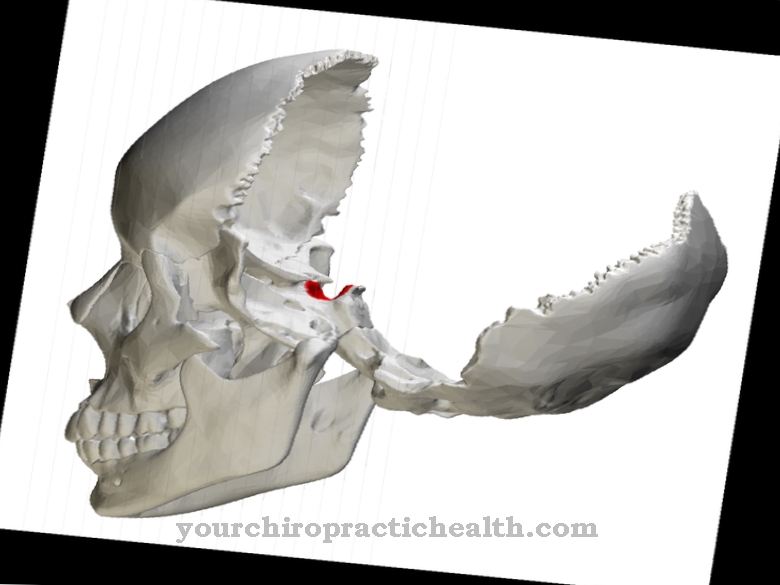From Delusions or. paranoia one speaks when a person perceives threats that are not real. Usually delusions occur in the context of a psychosis. The reason for this is a disturbed brain metabolism.
What are delusions?
Delusions are characterized by the fact that people assume threats of some kind which, however, do not exist in reality, but rather "only take place in their heads", so to speak. These feelings of threat can be of various kinds: for example a suspected conspiracy by fellow human beings, by extraterrestrials, by secret services, by the devil, etc.
Which shape the paranoia assumes that this typically depends on the living conditions of the person concerned. Delusions can lead people who believe they are threatened to be led into actions that they would not otherwise do. They can also become aggressive as part of an imagined self-protection and pose a threat to themselves or others. This is what makes the phenomenon so dangerous and often requires inpatient treatment.
causes
Usually one has roots paranoia (of whatever kind) in a psychosis, whereby there are different types of psychoses: bipolar, schizoaffective and schizophrenic. Due to a disturbed brain metabolism, which mainly affects the neurotransmitter dopamine, the perception of those affected is distorted or incorrect.
Causes for a psychosis with the following delusions can be a genetic disposition, drug use, alcohol abuse or a general mental overload. Psychoses often occur in particularly stressful life situations that those affected are not up to: exam situations, social differences with loved ones or a new phase in life.
As a result of the overload, the chemical balance in the brain is upset, so to speak, which results in distorted perception. The person concerned tries to explain the strange feelings that come over him, and thus builds a delusional system.
Symptoms, ailments & signs
Paranoia leads to hallucinations and delusions. Those affected distrust their environment. Often no distinction is made between strangers and loved ones. You think others want to harm you. Patients feel lies and deceit everywhere. In extreme cases, there is even constant fear of death.
In addition, there is the feeling of being constantly observed. Everyday life is characterized by aggression and megalomania. You act remarkably odd and opinionated in ordinary situations. If women and men are confronted with their delusions, they are put off. They are not accessible to any rational insight. Usually they even reinforce counter-arguments and worsen their illness.
In their supposed astuteness, they convince themselves that precisely the contrary views are evidence of their right path. Patients suffer internally - even if they don't want to admit it externally. They feel despised by those around them. A low self-esteem is often a sign of well-being.
The psychological behavior disorder has complex manifestations. It also accompanies a number of other diseases such as neuroses, personality disorders and schizophrenia. Sometimes it occurs after alcohol and drug addiction. Scientists have found that paranoia can accompany Alzheimer's patients. Tumor diseases in the brain also favor delusions.
Diagnosis & course
Conspiracy theories or paranoia give doctors a first solid clue that a psychosis is present because these are typical signs. Often those affected have already become suspicious several times in advance and usually only go to a doctor at the urging of relatives or friends.
Most of the time, the sick have built up a real delusional system with which they categorize reality and interpret the living environment. Through a long, sensitive conversation, a doctor can find out whether a paranoia or a psychosis is present. If the psychosis is not treated, it can become chronic, i.e. become permanent.
With early intervention, however, successful treatment with medication is usually possible. As a rule of thumb, it is believed that about a third of patients recover completely, another third will relapse, and another third will remain trapped in the condition.
Complications
The risk of delusional complications increases with the duration of the illness and failure of psychotherapeutic or drug treatment. Paranoid attacks are particularly relevant to the occurrence of possible complications that are not due to the permanent state of paranoia and the associated personality disorders.
Such attacks can increasingly lead to action on the part of the person concerned due to the delusions, which endangers him and his environment. For example, acts of violence can occur because, for example, people delusively believe that something or someone needs to be protected. Even nonsensical actions in this context can sometimes lead to economic and social problems. Legal consequences for those affected are also conceivable.
The megalomania that is just emerging is fueling these complications. All of these actions are also risky for the person concerned, as they become part of the delusion and fears and anger are projected onto them. The behavior of the paranoid, which is more and more characterized by a delusion, over time causes an alienation from the environment and a withdrawal from the job.
In addition, paranoia is almost always associated with other personality disorders, most of which have depressive and self-harming elements. Accordingly, as a complication, there is also the risk of harming themselves - up to suicide.
When should you go to the doctor?
People who temporarily report on the visual perception of figures or shadowy figures should continue to observe their impressions. If these irregularities increase in size and intensity, the person concerned needs medical help. If the reasons can be traced back to a situation of overload, emotional overload or insufficient sleep, spontaneous healing occurs in most cases. Stressors should be reduced and sleep hygiene optimized so that lasting relief can be achieved. A characteristic of delusions is the lack of insight on the part of the person concerned into the processes that have been experienced and described.
Behavioral problems, an aggressive demeanor and vehement defense of perceptions indicate irregularities. If the impressions of the person concerned cannot be understood objectively, this should be discussed openly. In severe cases, a medical officer should be called, as there is no other way of making a diagnosis due to the lack of insight into the disease.
If the person concerned is convinced that he is being persecuted, that he is being given thoughts or that he is receiving calls to action from imaginary figures, he needs help. If there is no connection to reality, everyday obligations can no longer be fulfilled or hysterical behavior occurs, a doctor should be consulted. Self-destructive acts or attacks of a verbal or physical nature against other people are considered warning signals. You should see a doctor as soon as possible.
Treatment & Therapy
To treat the paranoia or. Delusion so-called neuroleptics are administered, which must be taken regularly. These neuroleptics act as a buffer for the overstimulated brain (too much dopamine) and curb the psychosis if the right drug is chosen.
Since not so much is known about psychoses and neuroleptics, it is often necessary to first try out which drug or which combination of drugs works. An accompanying talk therapy is also useful to help the person affected to find their way back to reality and to come to terms with what has supposedly happened, because it was or is very real for the patient.
Often one works with so-called benzodiazepines, tranquilizers, for a not too long period of time, so that the person concerned can sleep and generally come to rest again. However, these have to be discontinued after a few months because they are highly addictive. Inpatient treatment is often required overall until the patient has stabilized again and is no longer a threat to himself or the environment.
You can find your medication here
➔ Medicines to calm down and strengthen nervesprevention
To get a new boost of Delusions To prevent this, it is necessary to take the medication regularly and consult a specialist on a regular basis. Those affected also need a regular daily routine and should be socially integrated as far as possible. Adequate occupation that clearly structures the day can also work wonders. Alcohol or drugs should not be consumed.
Aftercare
As with comparable mental illnesses, delusions require professional follow-up care. There are different forms of delusion, so there is no universal follow-up care. In the case of paranoia, psychotherapeutic follow-up care as individual or group therapy has proven its worth. Each patient has to find out for himself which method is appropriate for him.
The disease affects the person affected far beyond the completed treatment. In many cases, patients remain lifelong with the mental disorder. The aim of aftercare is to achieve a stable state after successfully completing psychotherapy. Relapses should be avoided. The sick person must become aware of the situation that triggers delusions in him.
The disease makes many patients unable to work. In this case, too, the affected person receives emotional support during aftercare. His self-confidence must be stabilized, otherwise depression can develop in addition to the delusions. The sick person learns more targeted mindfulness with himself during aftercare. For this he has to find his own personal way.
If he takes distance from certain acquaintances for the time being and needs time for himself, this is not fundamentally questionable, but can be part of his healing path. If the patient seems satisfied with the decision and his condition improves, the therapist should allow this step and accept it as correct.
You can do that yourself
When a patient suffers from delusions (paranoia), it is very stressful for him as well as for his surroundings or family. In order to be able to do something against the underlying psychosis, it is important to know what caused it. If excessive stress triggered the delusions, the patient should slow down and allow himself long breaks. A regulated sleep / wake rhythm is also an advantage here.
If drug or alcohol consumption is the cause of the paranoia, a strict ban on drugs and alcohol applies. Anyway, a person who is prone to psychosis should pay attention to a healthy lifestyle. In doing so, he supports his own recovery and does not endanger it additionally. In addition to a balanced diet, a healthy lifestyle also includes sufficient exercise, ideally in the fresh air. Exercise regulates your metabolism and improves your mood.
The medication prescribed by the doctor must be taken consistently. Unauthorized attempts to escape usually lead to renewed paranoia. In any case, psychotherapy is helpful, in which the current life situation of the patient is sounded out. Here it is important to determine where the disease triggers are hiding and what is behind the paranoid thoughts.
Regular meditations and breathing exercises are other ways to counteract delusions. Knock acupressure (EFT) is also recommended as a self-help measure. It helps against emerging fears, stress or panic attacks.

.jpg)



.jpg)



















.jpg)

.jpg)
